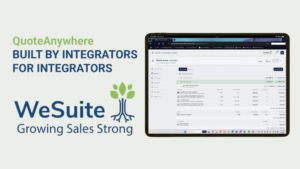How Do You Win Over Difficult Customers? Try Redefining the Problem.
As sales professionals, we’ve all been there, giving our strongest pitch only to be met with crossed arms and a frown…

By Tracy Larson
As sales professionals, we’ve all been there, giving our strongest pitch only to be met with crossed arms and a frown. No matter what we say, the customer’s mind is made up. They’re convinced our company’s products and services can’t solve their problem.
I’m sure you’ve experienced this when selling security. At WeSuite, we have too, as we discuss the value of our sales management software to companies like yours. The prospect thinks their issues are unique and their challenges too complicated for us to understand, solve, or support. We know we can help them, but they’re not open to a true discussion. Do we walk away? Sometimes. But there’s another approach that has real merit. We redefine the problem.
Sales management software does so many things! Depending on your role at the company, you’ll value different features and capabilities. Sometimes, we get our foot in the door because our initial contact has one set of priorities and issues to resolve, but when we present to their larger team, other key stakeholders have different challenges in mind.
Here’s an example:
A Sales Director is seeking a tool that makes it easier for her team to quote and close in the field and from the desktop. She wants it to standardize products and pricing, automate approvals, automatically generate professional, branded proposals and contracts, and provide immediate reporting to evaluate performance and processes for better coaching.
Enter sales management software. Check, check, check, check, and check. In her mind, our solution fits the bill perfectly. She’s not focused on how the system gets set up or maintained, just that it works. However, she’s not the only one making the purchase decision.
The head of Operations is very concerned with workflow. Can the software be configured to perform as desired? Is it sophisticated enough to support how the company needs to design and estimates projects? Can it accommodate frequent exceptions to standard procedures? We know it can, but the client is skeptical. They’re wedded to the ‘devil’ they know – manual processes, their spreadsheets, forms, and nothing we say will change their mind. Do we walk away from this hypothetical client? No! We redefine the problem.
During our conversation, we learn that the client is very satisfied with the company’s accounting platform. However, using manual spreadsheets requires redundant data entry into the accounting system when sales wins jobs. The process is not only inefficient and results in human error, pricing and products are out of date in their spreadsheets, and maintenance is a beast. Not only does our seamless integration with the client’s accounting software automate ‘won’ sales information to accounting, it reads data real-time saving time, increasing accuracy and profitability. Suddenly, there’s interest!
Can they keep their spreadsheets? Sure but, why would you do that? Spreadsheets are full of risk to the business. ‘Garbage in. Garbage out.’ does not help you grow your business strong. A centralized database enables the entire sales team. They have access to existing customers, addresses, contacts, parts, labor, and services at their fingertips without need to wait for someone to update another spreadsheet! Centralization keeps your data in your business and creates smooth, repeatable workflows. Plus, salespeople have automation features like margin calculations, commissions, approvals, proposal generation, and electronic contracts fully supporting their process, saving valuable selling time, and giving them their independence.
I’m sharing this story because it offers up two valuable lessons.
First, if you’re considering sales management software for your company, think about the many problems it can solve. It only needs to solve some of them to quickly deliver a real return on investment. Few clients use all of our features, but they find tremendous value in the ones that are right for their business.
Second, this example might help you with your own sales. Next time you present to a prospect, don’t get discouraged if everyone in the room isn’t on board with the solution you’re pitching. Listen to their needs and objections, try to understand where you CAN deliver on what they need, and then redefine the problem. Sales management software can make it easier. Flexible, collaborative tools allow users to reconfigure system designs, break projects into phases, and layer different security solutions within a single project.
Remember, selling is about solving problems. If the problem and solution don’t match, don’t always assume your answer is at fault. Maybe you just need to find a different problem!
Recent Post

WeSuite Expands Its QuoteAnywhere to a Full-Featured Stand-Alone Sales Platform
WeSuite, a manufacturer of award-winning sales management software for security technology sales and service providers, is excited to announce the expansion of its web-based sales software, QuoteAnywhere, to a full-featured, stand-alone, lead-to-close sales platform.

WeSuite President Tracy Larson Inducted into Security Sales & Integrations Industry Hall of Fame
WeSuite, a manufacturer of award-winning sales management software for security technology sales and service providers, announced today that Tracy Larson, WeSuite President and Co-Founder, has been inducted into the Security Sales & Integration’s Industry Hall of Fame.

Are You Getting the Most Out of Your CRM? Start by Asking these 5 Simple Questions
Your sales pipeline is your lifeline. It tells you where your deals stand, where your time should go, and how close you are to hitting your number. And your CRM? It’s the tool that keeps your pipeline in check.

Is There a Secret to Closing Security Sales Faster? Here Are Seven!
Pushy, high-pressure sales tactics turn off buyers – we’ve all been there! Fortunately, you can increase your on-the-spot close ratio by being buyer and solution oriented with sales automation software like QuoteAnywhere from WeSuite to support your sales efforts.
